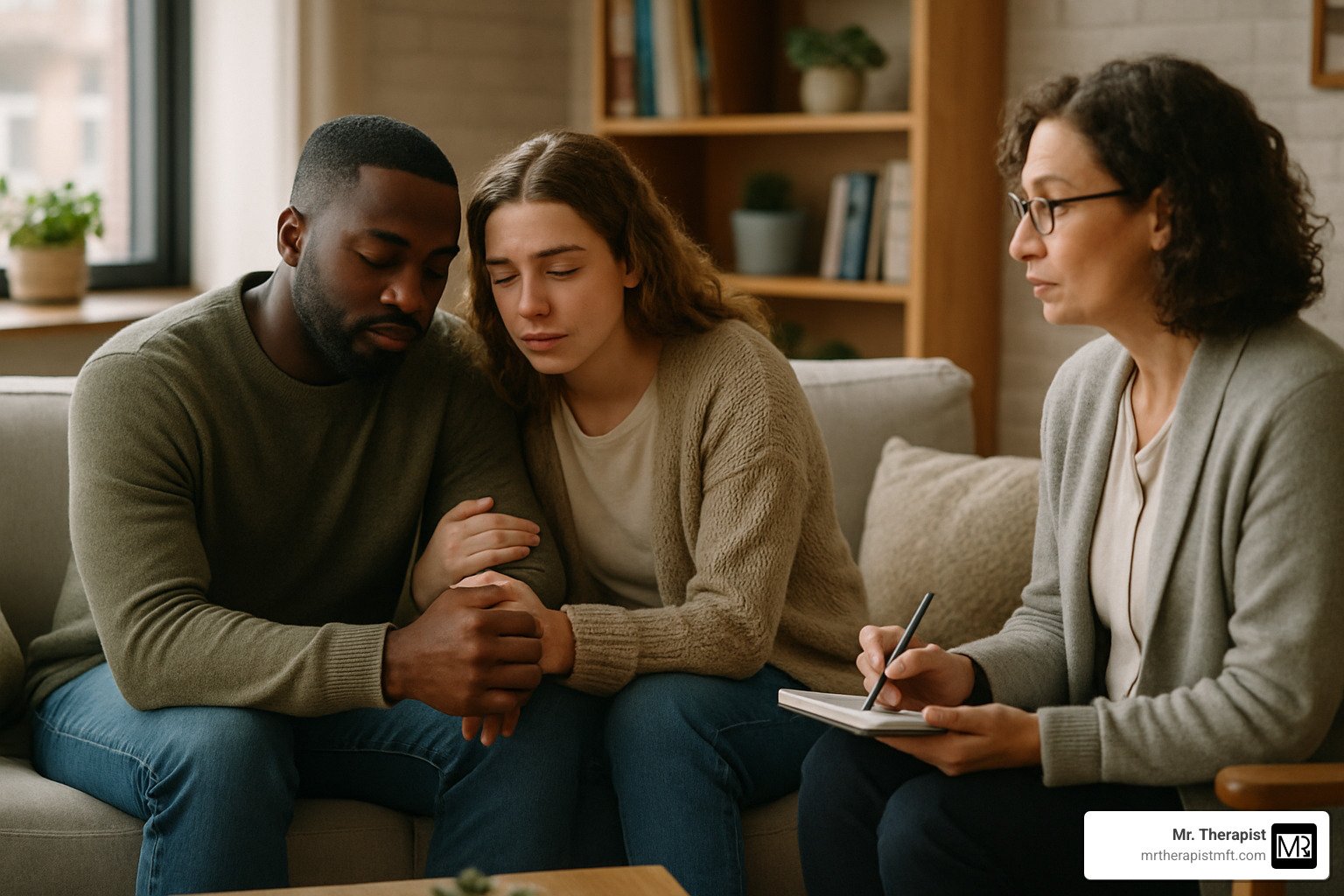
Coping with anxiety and depression can seem overwhelming at first, but there are effective strategies that can help restore balance to your life. If you’re feeling lost or alone in the battle against these mental health challenges, know there is hope. Here’s a quick look at what can make a difference:
- Talk to someone: Reach out to a friend or therapist.
- Take care of your body: Exercise, eat healthily, sleep well.
- Practice mindfulness: Try meditation and relaxation techniques.
- Limit harmful substances: Cut back on alcohol and caffeine.
- Set small goals: Achieve daily victories, no matter how small.
Anxiety and depression can feel like an enormous weight, but they are common experiences that many people face. When sadness or worry interferes with daily life, it’s a sign that help might be needed. These feelings are more than just mood fluctuations—they can deeply affect our ability to function and connect with others.
In the world of today, where life’s demands never seem to pause, taking care of our mental health is crucial. This is especially true for people like Alex, who are juggling career achievements with personal challenges. Depression and anxiety can arise from various causes, including genetics, traumatic events, or even prolonged stress. It’s important to remember that these conditions are not signs of weakness; rather, they are part of the human experience.
Finding the right tools and support can lead to a path of healing and emotional resilience. Let’s explore some helpful methods to move from stress to serenity.

Understanding Anxiety and Depression
Anxiety and depression are two of the most common mental health conditions, but they can be quite different. Let’s break them down.
Symptoms
Depression is more than just feeling sad. It often involves:
- Persistent feelings of sadness or emptiness
- Loss of interest in activities you once enjoyed
- Changes in appetite or weight
- Trouble sleeping or sleeping too much
- Feelings of worthlessness or guilt
- Difficulty concentrating
- Thoughts of death or suicide
Anxiety, on the other hand, is characterized by:
- Excessive worry or fear
- Restlessness or feeling on edge
- Trouble concentrating
- Irritability
- Muscle tension
- Sleep disturbances
Despite their differences, these conditions often overlap. For instance, both can lead to irritability and sleep issues.

Causes
The exact causes of depression and anxiety are not completely understood, but several factors can play a role:
- Genetics: Having a family history of mental health conditions can increase your risk.
- Traumatic events: Experiencing abuse, the loss of a loved one, or major life changes can trigger these conditions.
- Medical conditions: Chronic illnesses like cancer or heart disease can lead to depression.
- Substance use: Alcohol and drugs can worsen symptoms.
- Medications: Some medications may have side effects that contribute to depression or anxiety.
Mental Health Conditions
Anxiety and depression are not just temporary feelings—they are recognized mental health conditions. They can affect anyone, regardless of age or background. About 1 in 6 adults will experience depression at some point in their life.
An important note is that many people with depression also experience anxiety, and vice versa. In fact, a 2015 survey found that 41.6% of people reported having both major depression and an anxiety disorder within the same year.
Recognizing these conditions and their symptoms is the first step toward getting help. With the right support, coping with anxiety and depression becomes more manageable. In the next section, we’ll explore effective lifestyle changes that can support mental health.
Coping with Anxiety and Depression
Dealing with anxiety and depression isn’t easy, but there are effective strategies to help manage these conditions. Let’s explore therapy, medication, and lifestyle changes as ways to cope.
Therapy
Therapy, also known as counseling, is a powerful tool for managing anxiety and depression. By talking with a therapist, you can learn skills to handle life’s challenges and change behaviors that cause problems. Common goals of therapy include:
- Quitting smoking or stopping substance use
- Overcoming fears or insecurities
- Coping with stress
- Improving relationships
Therapy focuses on your current life issues, but understanding your past can also be beneficial. It’s important to talk openly with your therapist about your feelings, as this is a key part of healing. You’re not alone—many people find relief through therapy.
Medication
Medication can also be helpful, especially for those with more severe symptoms. Antidepressants are the most common type of medication used to treat depression. These can also help with anxiety symptoms. It’s crucial to work closely with your doctor to find the right medication and dosage for you. Here are some tips:
- Be patient: It can take up to 4 weeks to feel the full benefits of antidepressants.
- Follow instructions: Take your medication as prescribed, and don’t stop suddenly without consulting your doctor.
- Report side effects: If you experience side effects, let your doctor know. They may adjust your dosage or try a different medication.

Lifestyle Changes
Making changes to your daily habits can significantly impact your mental health. Here are some lifestyle adjustments that can help:
-
Good Nutrition: Eating well-balanced meals and staying hydrated can improve your mood. Even mild dehydration can affect how you feel, so drink plenty of water.
-
Exercise: Regular physical activity is a natural mood booster. It releases endorphins, which can help reduce symptoms of anxiety and depression.
-
Sleep: Aim for 7-9 hours of quality sleep each night. Good sleep hygiene includes maintaining a regular sleep schedule and creating a restful environment.
-
Meditation: Practices like meditation or mindfulness can help reduce stress and calm anxiety. Even a few minutes a day can make a difference.
-
Avoiding Substances: Limiting alcohol and other substances can prevent worsening symptoms. Alcohol is a depressant and can interfere with medications.

These approaches, combined with professional help, can make coping with anxiety and depression more manageable. In the next section, we’ll explore effective lifestyle changes that can support mental health.
Effective Lifestyle Changes
Making some simple changes in your daily life can make a big difference when it comes to coping with anxiety and depression. Let’s look at some key areas you can focus on:
Sleep
Prioritizing sleep is essential. Aim for 7-9 hours of sleep each night. Keeping a regular sleep schedule, even on weekends, helps regulate your body’s internal clock. Avoid screens before bed, as the blue light can interfere with sleep quality. Instead, try listening to a podcast or engaging in a calming activity to wind down.
Exercise
You don’t need to run a marathon to feel better. Just a simple 10-minute walk each day can boost your mood. Exercise releases endorphins, helping to alleviate symptoms of anxiety and depression. Consider activities like yoga, which combines movement with breathing techniques to promote relaxation.
Nutrition
Eating well can improve how you feel. Try to have balanced meals with plenty of fruits, vegetables, and whole grains. Avoid skipping meals, and keep healthy snacks on hand. It’s easy to reach for comfort foods when stressed, but these often lead to energy crashes.
Meditation
Practicing meditation or mindfulness daily can help calm your mind. Even a few minutes of deep breathing or guided meditation can reduce stress and anxiety. Techniques like the 4-7-8 breathing method are simple to learn and can be done anywhere.
Substance Use
Limiting alcohol and avoiding recreational drugs is crucial. Alcohol can worsen depression and anxiety, and it may interfere with medications. If you find yourself using substances to cope, consider seeking support to explore healthier coping mechanisms.
These lifestyle changes, along with professional support, can help you manage anxiety and depression more effectively. Next, we’ll explore practical coping strategies that you can start using today.
Practical Coping Strategies
When coping with anxiety and depression, having some practical strategies up your sleeve can make a world of difference. Let’s explore some effective methods you can start using today:
Mindfulness
Mindfulness is all about staying present in the moment. It can help you break free from the cycle of worry and sadness. A simple way to practice mindfulness is by focusing on your breath. Try the 4-7-8 breathing method: inhale for 4 seconds, hold for 7, and exhale for 8. This can calm your mind and reduce stress.
Relaxation Techniques
Finding ways to relax can significantly ease symptoms of anxiety and depression. Consider activities like listening to music, taking a warm bath, or practicing yoga. These can help soothe your mind and body. Even watching a favorite movie or spending time with a pet can be a form of relaxation.
Socializing
Staying connected with friends and family is crucial. Socializing helps improve your mood and provides a support system when you’re feeling low. You don’t have to dive into big gatherings; even a simple phone call or a walk with a friend can make you feel less alone.
Routine
Having a routine can bring structure to your day and make life feel more manageable. Start by setting small goals, like waking up at the same time each day or planning your meals. This can provide a sense of stability and accomplishment, helping to combat feelings of chaos or overwhelm.
Incorporating these strategies into your daily life can help you manage anxiety and depression more effectively. Small steps can lead to big changes. Next, we’ll tackle some frequently asked questions about these conditions.
Frequently Asked Questions about Coping with Anxiety and Depression
How to deal with anxiety and depression?
Dealing with anxiety and depression often involves a combination of therapy and lifestyle adjustments. Therapy, such as cognitive behavioral therapy (CBT), can provide you with tools to understand and manage your thoughts and feelings. A healthier lifestyle—including regular exercise, balanced nutrition, and sufficient sleep—can also have a profound impact on your mental health. According to Dr. Jamie Dupuy, just a 10-minute walk daily can boost your mood by releasing serotonin and endorphins.
What is a common strategy for coping with anxiety and depression?
A common strategy includes guided meditation and positive affirmations. Guided meditation can help you focus your mind and reduce stress, while positive affirmations can shift your mindset from negative to positive. For instance, telling yourself “I am capable” or “I am strong” can help build emotional resilience.
What is the 3 3 3 rule for anxiety?
The 3 3 3 rule is a simple coping strategy for anxiety management. When you feel anxious, look around and name three things you see, then identify three sounds you hear, and finally, move three parts of your body, such as your fingers, toes, or shoulders. This technique helps ground you in the present moment, diverting your mind from anxious thoughts.
By integrating these strategies into your life, you can better manage the challenges of anxiety and depression. Small, consistent efforts can lead to significant improvements in your mental well-being.
Next, let’s explore the conclusion of our discussion on coping with anxiety and depression.
Conclusion
At Mr. Therapist, we believe in the power of emotional resilience as a cornerstone for healing. Founded by Manny Romero, our practice focuses on helping individuals and families in California steer the complexities of anxiety and depression through Emotion-Focused Therapy. This approach empowers you to accept your emotions and use them as tools for healing.
Emotional resilience is not just about bouncing back from challenges; it’s about understanding and using your emotions to build a fulfilling life. Our therapy sessions are designed to help you recognize and process your feelings, enabling you to respond to life’s stresses with confidence and clarity.
Healing through emotions is central to our philosophy. Instead of avoiding or suppressing your feelings, we guide you to explore them in a safe and supportive environment. This exploration can lead to profound personal growth and a deeper understanding of yourself and your relationships.
If you’re seeking support in your journey towards emotional well-being, we invite you to learn more about our services. Whether you’re dealing with anxiety, depression, or seeking to improve your emotional health, we’re here to help.
Take the first step towards a healthier, more resilient you by exploring our services.
You are not alone in this journey. Together, we can transform stress into serenity and find strength in vulnerability.



